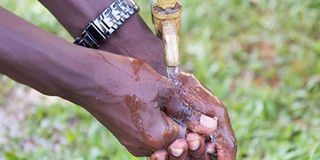We should make washing hands a way of life

The simple act of handwashing, for example, is the single-most cost-effective way of stopping child deaths. PHOTO | FILE | NATION MEDIA GROUP
What you need to know:
- We need the private sector, the public sector, the social sector and the entire community to come together stronger than ever before to create a brighter future for our children.
- In Kenya, Unilever’s Lifebuoy has been partnering with the Heroes4Change programme to drive large-scale handwashing education programme.
Every 23 seconds, a child dies from either pneumonia or diarrhoea worldwide.
This is despite the fact that we know access to safe water, adequate sanitation and proper hygiene education — or WASH (water, sanitation and hygiene) — can reduce illness and death and have an impact on poverty reduction and socioeconomic development.
The simple act of handwashing, for example, is the single-most cost-effective way of stopping child deaths. It can reduce the incidence of pneumonia by 23 per cent and diarrhoea by up to 45 per cent.
When more people use soap regularly and have access to sanitation, the impact on health is significant.
In fact, if everybody followed ideal handwashing habits — washing with soap before eating and after using the toilet — each person would require around 20 bars of soaps a year.
However, consumption levels are far below this with 1.5 billion people using less than eight bars of soap per year. This clearly shows the magnitude of the task the world faces in terms of driving the Wash agenda.
COLLABORATION
While progress is being made on the Wash agenda with two of the Sustainable Development Goals — SDG3, good health and hygiene; and SDG6, clean water and sanitation — clearly calling this out, more need to be done.
To address this challenge, we need the private sector, the public sector, the social sector and the entire community to come together stronger than ever before to create a brighter future for our children.
Towards this end, a game-changing approach is in empowering young people to drive change. The power of young people in driving change all over the world across many issues is well known.
They want to be part of something meaningful and have an impact — for themselves, for their community and the world.
Their connectedness, their collaboration and their sense of community is what is going to make a big difference.
In Kenya, Unilever’s Lifebuoy has been partnering with the Heroes4Change programme to drive large-scale handwashing education programmes, harnessing the untapped power of young university students.
DRIVING CHANGE
The programme was deployed in 2017 with 100 young heroes reaching more than 100,000 children across Kenya.
Following its success, this year, 500 heroes were recruited and they reached 700,000 children, teaching them the life-saving habit of handwashing.
Its success has now inspired organisations to join the model. As more join the programme, its scale and impact in driving handwashing behaviour change will increase dramatically.
Another aspect of this journey is to constantly raise awareness of the importance of handwashing with soap to prevent disease.
A major event to do this is the Global Handwashing Day (GHD), which is marked every October 15. Across the world, 200 million people take part in celebrating GHD in more than 100 countries.
AWARENESS
Lifebuoy is a founding partner of the Global Handwashing Partnership, which has supported GHD from the outset.
We have reached more than a billion people through handwashing programmes and TV reach.
Today, give a high-five to the person next to you to celebrate GHD. Besides being a sign of celebration, a high-five is, most importantly, also a sign of clean, confident hands. It’s a way of life.
Mr Pawan is the marketing director at Unilever. [email protected]




